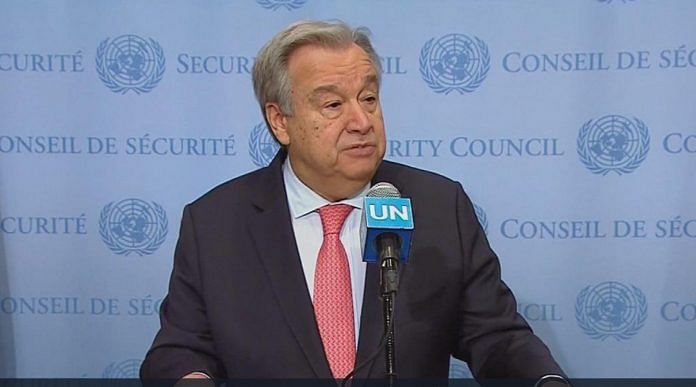New Delhi: The subsidies given to the fossil fuel industries in India is seven times more than what is offered to renewable energies, UN General Secretary António Guterres said Friday while stressing on the importance of investing in clean energy.
“I have asked all G20 countries, including India, to invest in a clean and green transition as they recover from the Covid-19 pandemic. This means ending fossil fuel subsidies, placing a price on carbon pollution and committing to no new coal power plants after 2020,” Guterres said while delivering the 19th Darbari Seth Memorial Lecture.
The annual lecture series is organised by The Energy and Resources Institute (TERI) in memory of its founder Darbari Seth.
Guterres talked about how Seth was also a climate action pioneer who “stressed that India must end its reliance on pollution, financially volatile and costly fossil fuels, and instead invest in clean, economically resilient solar power”.
The UN chief also emphasised how clean energy can help economies cope with the twin crises of the Covid-19 pandemic and the climate change.
He pointed out that millions in India still do not have access to electricity, and this issue can be addressed by investing in renewable energies, which also generates three times more jobs than fossil fuel industries.
Also read: Asia faces $4.7 trillion labour loss by 2050 due to climate change, McKinsey warns
‘Coal plants will become uncompetitive in future’
According to Guterres, while India has shown a positive trend by increasing its renewable energy capacity from 17 per cent to 24 per cent during the pandemic, several G20 countries continue to open new coal power plants and conduct coal auctions.
He highlighted that running existing coal plants is a more expensive venture than setting up renewable energy plants. Therefore, most coal plants in the world are most likely to become uncompetitive in the future.
“In India, 50 per cent of the coal will be uncompetitive in 2022, reaching 85 per cent by 2025. This is why the world’s largest investors are increasingly abandoning coal,” said Guterres.
“The advantages of India’s renewable resources are plain to see. They are low cost, protected from volatile commodity markets and offer three times the job potential of fossil fuel power plants. They can improve air quality at a time when our cities are choking,” he added.
The UN general secretary also spoke about how India is already experiencing impacts of climate change. Floods and droughts have become more frequent and severe — causing major damage to food systems, local economies and human health, he said.
This year, floods in Assam, Bihar and most recently in Uttar Pradesh have led to large-scale loss of life and infrastructure.
Also read: Everyone around the world is ditching coal – except India, China
‘World at crucial juncture’
Guterres stressed on the importance of effective decision-making in terms of climate change, especially as countries look to recover from the devastation wreaked by the Covid-19 pandemic.
“The world is at a crucial juncture. As governments mobilise trillions of dollars to recover from Covid-19 pandemic, their decisions will have climate consequences for decades,” he said.
“These decisions could either propel climate action forward, or set us back by years — which science says we can not afford,” added Guterres.
He also lauded India’s efforts in embracing clean energy technologies, despite the many challenges it faces.
“I am inspired by the Indian government’s decision to increase its renewable energy capacity from its initial 2015 goal of 175 gigawatts to 500 gigawatts in 2030,” said the UN chief.
He noted that the number of people working in renewable energy in India had increased five-fold since 2015, and spending on solar energy surpassed the expenditure on coal-based power generation for the first time in 2019.
“If it speeds up its shift from fossil fuel to renewables energies, India can become a true global superpower in the fight against climate change,” said Guterres.
Also read: Climate change is set to become worst crisis of our time. Covid recovery could change that




It is UN chief talking or Big oil.